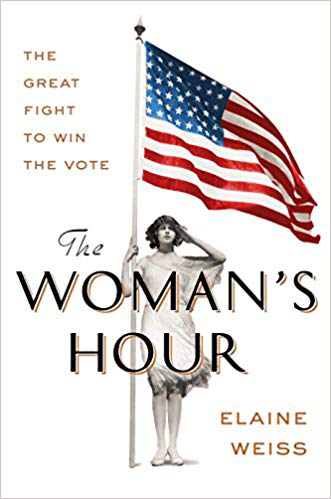
The Woman's Hour: The Great Fight to Win the Vote by Elaine Weiss
"The Woman's Hour" begins with three women speeding by rail towards Nashville to lobby and campaign – Carrie Catt, president of the National American Woman Suffrage Association; Josephine Pearson, a formidable 'Anti;' and Sue White, a young Tennessee activist for the more radical National Women's Party. All three women were passionate and forceful in their own ways. Weiss explains the strategies and philosophies of both major 'Suff' parties and how they mobilized to raise money, gain votes and keep politicians' loyalties. She also examines how the 'Antis' used dirty tricks such as plying politicians with free liquor and using bribes, intimidation, and even fake emergency calls from family to get them out of town.
Antis also invoked 'states' rights' and the threat of Black women voting white men out of office, 'destroying' Southern 'civilization' already weakened by the Civil War and Reconstruction. While all of the early suffragists began as abolitionists, some did abandon racial equality in the fight for women's rights. Weiss details unflinchingly how, when faced with either expediency or a difficult route, suffragists took the easier way by assuring Southern men that if women could vote, black male and female voters would still be in the minority.
Suffrage was hotly debated everywhere in Tennessee. Priests and pastors of every denomination railed from pulpits against women's suffrage. Liquor companies thought that if women could vote, Prohibition would become permanent. Railroads worried about women voters taking away their money, and manufacturers feared women calling for equal pay and an end to child labor.
Antis marshaled moral and biological claims against women entering public life. Weiss says their 'guilt-tripping harangue seems timeless; every modern working mother has heard a version.'
Suffragists in Tennessee built alliances from the ground up, shrewdly gaining the support of prominent, influential men. Slowly, public opinion around the country shifted in favor of the vote, and suffragists cajoled Tennessee to catch up with modern times. Still, when Tennessee senators assembled to ratify the 19th amendment, tensions were high and the outcome was uncertain.
You may know that the amendment passed by one vote, a young Harry Burn urged by his mother to 'be a good boy and help Mrs. [Carrie Chapman] Catt.' Weiss fleshes out the characters of Burns and his mother who later was hounded by the Antis in their rage over losing.
"The Woman's Hour" is rich with telling details about all the characters gathered in Tennessee for this final showdown, yet the story moves quickly with drama and suspense. Weiss also takes voting rights to the present day, calling out efforts at voter suppression and unfounded allegations of 'voter fraud.' Decrying racism in the suffrage movement and in current politics, Weiss says 'access to the vote is still manipulated for partisan political advantage, and true universal suffrage remains an elusive goal.' Hopefully, histories like "The Woman's Hour" can challenge us to honor past victories, to learn from past mistakes and to keep fighting for civil rights for all.
by Jan Hardy, Cataloging Specialist
